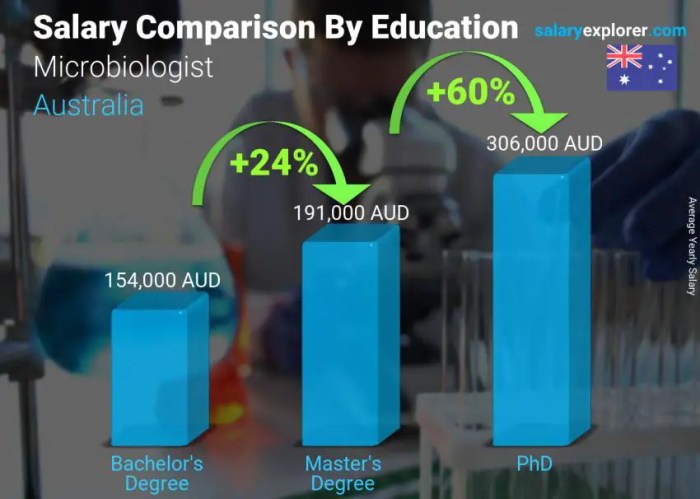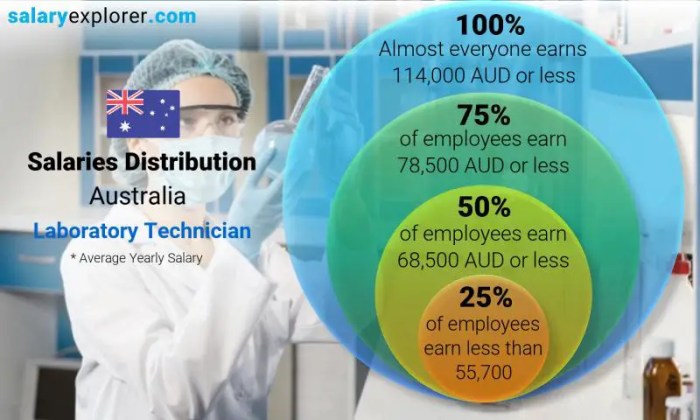Medical scientist salary australia is a topic of great interest to many professionals in the field. With a median salary of $95,000, medical scientists in Australia earn a competitive wage. This article will delve into the factors that influence medical scientist salaries, explore the job market and employment trends, and provide tips for negotiating a competitive salary.
Medical scientists play a vital role in the healthcare system, conducting research, developing new treatments, and diagnosing diseases. Their work has a direct impact on the health and well-being of the community, making them highly valued professionals.
Salary Ranges and Distribution: Medical Scientist Salary Australia

The salary of medical scientists in Australia varies depending on several factors, including experience, industry, and location. According to Salary Expert, the average annual salary for medical scientists in Australia is $105,000. However, salaries can range from $80,000 to $130,000 or more.
Medical scientists with more experience tend to earn higher salaries. For example, a medical scientist with 5-10 years of experience can earn an average of $110,000 per year, while a medical scientist with 10-15 years of experience can earn an average of $120,000 per year.
The industry in which a medical scientist works can also affect their salary. For example, medical scientists working in the pharmaceutical industry tend to earn higher salaries than those working in academia. Medical scientists working in the government sector typically earn lower salaries than those working in the private sector.
The location of a medical scientist’s job can also affect their salary. For example, medical scientists working in major cities such as Sydney and Melbourne tend to earn higher salaries than those working in regional areas.
In addition to experience, industry, and location, other factors that can influence a medical scientist’s salary include their specialization, qualifications, and research involvement. Medical scientists with specialized skills or qualifications, such as a PhD, can earn higher salaries than those without.
Medical scientists who are involved in research can also earn higher salaries than those who are not.
Salary Ranges by Experience
| Experience | Salary Range |
|---|---|
| 0-5 years | $80,000-$110,000 |
| 5-10 years | $110,000-$120,000 |
| 10-15 years | $120,000-$130,000 |
| 15+ years | $130,000+ |
Salary Ranges by Industry
| Industry | Salary Range |
|---|---|
| Pharmaceutical | $110,000-$130,000 |
| Academia | $90,000-$110,000 |
| Government | $80,000-$100,000 |
Salary Ranges by Location
| Location | Salary Range |
|---|---|
| Sydney | $110,000-$130,000 |
| Melbourne | $105,000-$125,000 |
| Brisbane | $100,000-$120,000 |
| Perth | $95,000-$115,000 |
Job Market and Employment Trends

The job market for medical scientists in Australia is highly competitive, with a strong demand for skilled professionals. The field is expected to grow significantly over the next 5-10 years, driven by factors such as an aging population and advancements in medical technology.
Medical scientists play a crucial role in the healthcare system, conducting research and developing new treatments and diagnostic methods. They work in various settings, including universities, hospitals, and research institutes. The demand for medical scientists is expected to remain strong as the healthcare industry continues to expand and new technologies emerge.
Employment Trends
The employment of medical scientists in Australia has been steadily increasing over the past decade. According to the Australian Bureau of Statistics, the number of medical scientists employed in Australia increased by 10.6% between 2011 and 2021. This growth is expected to continue in the coming years, with the number of medical scientists projected to increase by 12.2% between 2021 and 2026.
Projected Growth
The projected growth in the field of medical science is attributed to several factors, including:
- An aging population, which will lead to an increased demand for healthcare services.
- Advancements in medical technology, which will create new opportunities for research and development.
- A growing focus on personalized medicine, which will require medical scientists to develop new diagnostic and treatment methods.
Medical scientists with specialized skills and experience are in high demand. These skills include:
- Expertise in specific areas of medical research, such as cancer, cardiovascular disease, or infectious diseases.
- Experience in using advanced laboratory techniques and technologies.
- Strong analytical and problem-solving skills.
- Excellent communication and interpersonal skills.
Education and Qualifications
To become a medical scientist in Australia, a strong academic foundation is essential. The minimum educational requirement is a bachelor’s degree in a relevant field such as biomedical science, medical science, or a related discipline. These undergraduate programs typically cover the fundamental principles of biology, chemistry, and laboratory techniques.
Professional Certifications and Ongoing Professional Development
In addition to a bachelor’s degree, professional certifications and ongoing professional development play a crucial role in salary progression for medical scientists. The Australian Institute of Medical Scientists (AIMS) offers various certifications that demonstrate professional competency and adherence to industry standards.
These certifications include the Certified Medical Scientist (CMS) and the Fellow of the Australian Institute of Medical Scientists (FAIMS). Continuous professional development through workshops, conferences, and research collaborations is highly valued and can lead to salary increases and career advancement.
Specializations and Research Areas

Within the field of medical science, there are numerous specializations that can impact salary potential. These specializations often align with specific research areas, driving demand for professionals with expertise in those fields.
Emerging research areas, such as precision medicine and regenerative medicine, are creating new opportunities for medical scientists. These fields require specialized knowledge and skills, which can lead to higher earning potential.
Medical Biotechnology
Medical biotechnology focuses on the application of biological principles to develop medical products and treatments. Professionals in this field may work on drug discovery, gene therapy, or tissue engineering.
- Salary Range: $70,000 – $120,000 AUD
- Demand: High, driven by advancements in personalized medicine and gene editing
Clinical Research
Clinical research involves the study of human subjects to evaluate the safety and effectiveness of new medical interventions. Professionals in this field design and conduct clinical trials.
- Salary Range: $80,000 – $130,000 AUD
- Demand: Steady, as clinical trials are essential for developing new treatments
Benefits and Compensation
Medical scientists in Australia enjoy a range of benefits and compensation packages that are competitive within the healthcare industry. These benefits are designed to attract and retain skilled professionals in the field.
The typical benefits package for medical scientists in Australia includes:
- Competitive salaries
- Health and dental insurance
- Paid time off (vacation, sick leave, and personal days)
- Superannuation (retirement savings)
- Professional development opportunities
Comparison to Other Healthcare Professions
The benefits and compensation packages offered to medical scientists in Australia are comparable to those offered to other healthcare professionals with similar levels of education and experience. For example, medical scientists earn salaries that are similar to those of nurses, pharmacists, and radiographers.
However, medical scientists may have access to additional benefits, such as research funding and professional development opportunities, that are not typically available to other healthcare professionals.
Related Careers and Salary Comparisons
Medical scientists collaborate with other healthcare professionals, leading to a range of related careers in the medical field. Understanding the salary ranges of these professions provides a broader perspective on compensation in the medical industry.
Factors Influencing Salary Differences
Salary variations between medical scientists and related professions stem from factors such as:
Level of Education and Experience
Advanced degrees and specialized training often lead to higher salaries.
Job Responsibilities and Scope
Roles involving more complex tasks, research, and leadership typically command higher compensation.
Industry and Location
The healthcare industry and geographical location can impact salaries, with certain regions offering higher pay scales.
Industry Insights
The salary expectations and career paths for medical scientists can vary depending on the industry in which they work.
In the pharmaceutical industry, medical scientists typically earn higher salaries than those working in academia or biotechnology. This is because pharmaceutical companies are often more profitable and can afford to pay higher wages. Medical scientists in the pharmaceutical industry may also have the opportunity to work on more cutting-edge research and development projects.
Academia
In academia, medical scientists typically earn lower salaries than those working in the pharmaceutical industry or biotechnology. However, they may have more opportunities to teach and mentor students, and they may be able to conduct more basic research.
Biotechnology
Medical scientists working in biotechnology typically earn salaries that are comparable to those working in the pharmaceutical industry. However, they may have more opportunities to work on early-stage research and development projects.
Salary Negotiation Tips
Negotiating a salary can be a daunting task, but it’s important to remember that you have the power to advocate for yourself and get the compensation you deserve. Here are some tips to help you negotiate your medical scientist salary effectively:
Before you start negotiating, it’s important to do your research. Know what the average salary is for medical scientists in your field and location. You can find this information online or by talking to other medical scientists.
Be Prepared
Once you know what you’re worth, you need to be prepared to negotiate. This means having a clear idea of what you want and being willing to walk away if you don’t get it.
Be Confident
When you’re negotiating, it’s important to be confident. This doesn’t mean being aggressive, but it does mean believing in yourself and your worth.
Be Willing to Compromise, Medical scientist salary australia
Negotiation is all about compromise. You’re not going to get everything you want, and the other side isn’t going to get everything they want. Be willing to compromise on some points in order to get what you want on others.
Don’t Be Afraid to Ask for What You Want
The worst thing you can do in a negotiation is to be afraid to ask for what you want. If you don’t ask, you won’t get it. So don’t be afraid to state your desired salary and benefits.
Common Salary Negotiation Mistakes
Here are some common salary negotiation mistakes to avoid:
- Not doing your research
- Not being prepared
- Being too aggressive
- Not being willing to compromise
- Being afraid to ask for what you want
Closure
In conclusion, medical scientist salary australia is a reflection of the important role these professionals play in the healthcare system. With a strong job market and opportunities for career advancement, medical science is a rewarding and lucrative field for those with the necessary skills and qualifications.
Query Resolution
What is the average medical scientist salary in Australia?
The median salary for medical scientists in Australia is $95,000 per year.
What factors influence medical scientist salaries?
Factors that influence medical scientist salaries include experience, qualifications, specialization, research involvement, and location.
What is the job market for medical scientists in Australia?
The job market for medical scientists in Australia is strong, with demand for qualified professionals expected to grow in the coming years.